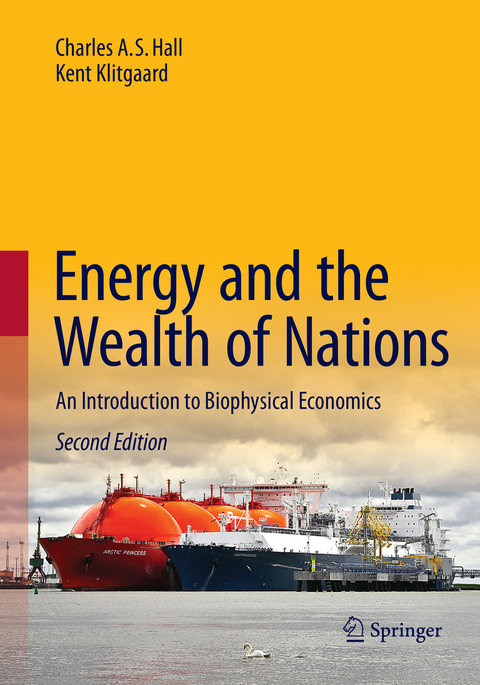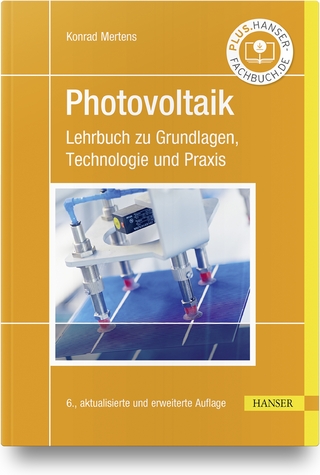
Energy and the Wealth of Nations
Springer International Publishing (Verlag)
978-3-030-09764-6 (ISBN)
For the past 150 years, economics has been treated as a social science in which economies are modeled as a circular flow of income between producers and consumers. In this "perpetual motion" of interactions between firms that produce and households that consume, little or no accounting is given of the flow of energy and materials from the environment and back again. In the standard economic model, energy and matter are completely recycled in these transactions, and economic activity is seemingly exempt from the Second Law of Thermodynamics. As we enter the second half of the age of oil, when energy supplies and the environmental impacts of energy production and consumption are likely to constrain economic growth, this exemption should be considered illusory at best. This book is an essential read for all scientists and economists who have recognized the urgent need for a more scientific, empirical, and unified approach to economics in an energy-constrained world, and serves as an ideal teaching text for the growing number of courses, such as the authors' own, onthe role of energy in society.
Charles A.S. Hall is a Systems Ecologist who received his PhD under Howard T. Odum at the University of North Carolina at Chapel Hill. Dr. Hall is the author or editor of seven books and more than 250 scholarly articles. He is best known for his development of the concept of EROI, or energy return on investment, which is an examination of how organisms, including humans, invest energy into obtaining additional energy to improve biotic or social fitness. He has applied these approaches to fish migrations, carbon balance, tropical land use change and the extraction of petroleum and other fuels in both natural and human-dominated ecosystems. Presently he is developing a new field, biophysical economics, as a supplement or alternative to conventional neoclassical economics, while applying systems and EROI thinking to a broad series of resource and economic issues. Kent A. Klitgaard is Professor of Economics and the Patti McGill Peterson Professor of Social Sciences at Wells College in Aurora, New York, where he has taught since 1991. Kent received his Bachelor's degree at San Diego State University and his Master's and PhD at the University of New Hampshire. At Wells, he teaches a diverse array of courses including the History of Economic Thought, Political Economy, Ecological Economics, The Economics of Energy, Technology and the Labor Process, and Microeconomic Theory, and is a co-founder of the Environmental Studies Program. Kent is active in the International Society for Ecological Economics, and is a founding member of the International Society for Biophysical Economics. Recently, his interests have turned towards the degrowth movement, and he has published multiple papers on the subject for Research and Degrowth.
Part I Energy and the Origins of Wealth.- Poverty, Wealth, and Human Ambition.- Energy and Wealth Production: An historical perspective.- The Petroleum Revolution I: The first half of the age of oil.- Part II Energy, Economics and the Structure of Society.- Explaining Economics from an Energy Perspective.- The Limits of Conventional Economics.- The Petroleum Revolution II: Concentrated Power and Concentrated Industries.- The Postwar Economic Order, Growth and the Hydrocarbon Economy.- Globalization and Efficiency.- Are there Limits to Growth? Examining the Evidence.- Part III Energy and Economics-the Basics.- What is Energy and How is it Related to Wealth Production?.- The Basic Science Needed to Understand the Relation of Energy to Economics.- The Required Quantitative Skills.- Economics as Science: Social or Biophysical?.- Part IV The Science Behind How Economies Work.- Energy Return on Investment.- Peak Oil, EROI, Investments and Our Financial Future.- Access to Energy and Social Inequality.- The Role of Economic Models for Good and Evil.- How to do Biophysical Economics.- Part V Understanding How Real World Economies Work.- Peak Oil, the Great Recession and the Quest for Sustainability.- Energy, Climate Science, and Planetary Boundaries.- Living the Good Life in a Lower EROI World.
"This second edition of Energy and the Wealth of Nation succeeds in covering both an enormously heterogenous selection of material while remaining utterly accessible. ... this textbook would be very useful for first- and second-year undergraduates, and also an excellent reference for upper years and indeed any person wishing to get an accessible introduction to the main concepts and analysis of biophysical economics." (Martin Sers, Journal of Environmental Studies and Sciences, Vol. 10, 2020)
"This textbook has constructed an excellent approach on how to better understand economies and natural systems, and their interactions. ... this book functions as a valuable academic discussion, as well as a starting point for the economic uninitiated. It has the potential to be an effective textbook for institutions looking to advance their economic teaching past the mainstream model and to seriously incorporate sustainable thinking into their teaching of economics." (Aaron Grinter, Economic Record, Vol. 95 (308), March, 2019)
| Erscheinungsdatum | 03.08.2021 |
|---|---|
| Zusatzinfo | XI, 511 p. 157 illus., 145 illus. in color. |
| Verlagsort | Cham |
| Sprache | englisch |
| Maße | 178 x 254 mm |
| Gewicht | 986 g |
| Themenwelt | Naturwissenschaften ► Biologie ► Ökologie / Naturschutz |
| Technik ► Elektrotechnik / Energietechnik | |
| Schlagworte | alternative energy assessment • Data-driven Science, Modeling and Theory Building • ecological economics book • Economics of Fracking • Economic Sustainability • Embodied energy • end of cheap oil • Energy Return on Energy Invested • energy return on investment • Eroi or Eroei of Unconventional Oil • Eroi or Erori of Alternative Energy • lack of economic growth • Limits to Growth • Oil Prices and the Economy • secular stagnation • wealth production energy |
| ISBN-10 | 3-030-09764-1 / 3030097641 |
| ISBN-13 | 978-3-030-09764-6 / 9783030097646 |
| Zustand | Neuware |
| Haben Sie eine Frage zum Produkt? |
aus dem Bereich


